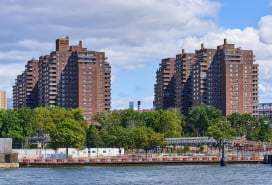Cuomo has finally reached a new 421a deal, but affordable housing advocates are less than thrilled

After sitting in limbo since its expiration in January, it looks like the controversial 421a tax abatement will live to see another day. Both the Real Estate Board of New York and Governor Andrew Cuomo announced late last week that a new deal had been reached to extend the program, which grants developers tax cuts in exchange for including affordable units in their new developments.
Under the new version, developers would receive a 100 percent tax abatement for 35 years, subsidized apartments would be required to remain affordable for 40 years, and developments in Manhattan below 96th Street would have to pay union workers an average of $60 an hour in wages and benefits when working on buildings with 300 or more units. (In Brooklyn and Queens, it would be $45 per hour.) This last bit is significant, as union wages were the sticking point that led to 421a's expiration in the first place.
“We are pleased to have reached an agreement that will permit the production of new rental housing in New York City, including a substantial share of affordable units, while also ensuring good wages for construction workers. We would like to thank Governor Cuomo for his leadership on this critical issue,” said REBNY Chair Rob Speyer in a statement.
The announcement comes shortly after news that the mayor is now requiring 421a developers to set aside units for homeless New Yorkers, as well as a push from housing advocates to do away with the program altogether, in favor of a new option that would create a greater amount of affordability.
Many in the affordable housing community are unimpressed with the new deal, citing concerns that 421a creates far too few affordable units, while draining the city of billions of dollars in tax revenue, and too easily allowing developers to illegally avoid providing the subsidized apartments they've promised.
"It’s historically unprecedented and unjustifiable on any fiscal or economic grounds,” Benjamin Dolchin, executive director of the nonprofit Association for Neighborhood and Housing Development told the New York Times. “Albany wants to pay REBNY to make a deal with the unions.”
We spoke with Dane Real Estate affordable housing developer Heidi Burkhart, who says, "It would be great to create more affordable housing, but making sure that the incentives are in place [to create subsidized units], and having affordable housing be a part of the conversation is important." The extension of 421a means that developers won't default to making condos (which are more lucrative) instead of rentals, says Burkhart, which can help ease the lack of rental inventory. (Then again, the condo market has slowed some, so switching to rentals now actually benefit them, too.)
Burkhart notes that she'd like to see more middle and moderate income housing options accounted for in the program, but adds, "This has been a conversation since 421a was expiring, it will be a conversation for the next version, it's going to be constantly reinvented."
In any case, the proposed new version still has to pass the State Legislature, so there may still be some push-and-pull over the program before it's finalized.
You Might Also Like




























